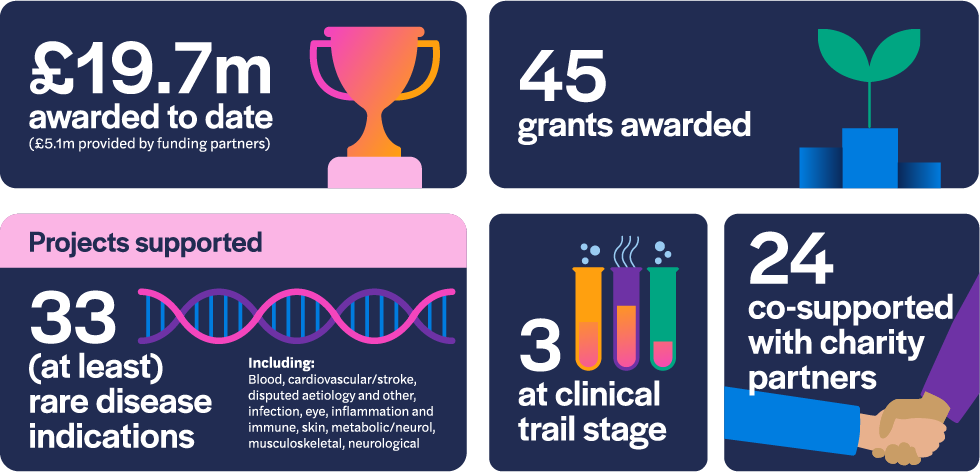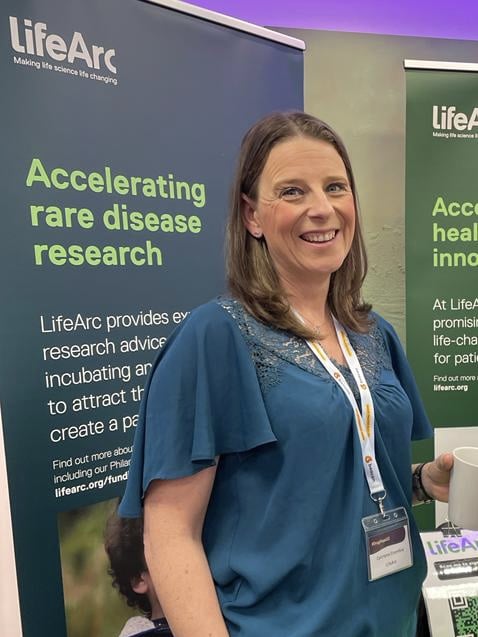Medicine research and development is challenging and takes a long time. With licensed medicines only available for 500 of the 7,000 rare and ultra-rare diseases, it is even harder because of the lack of funding and the challenges of understanding rare diseases where there are limited patient numbers.

To overcome these research challenges, LifeArc provides a range of advice, funding and science to help scientists turn promising research into potential treatments.
At LifeArc, we act as a trusted, strategic partner to academics, medical charities and patient groups to transform the way rare diseases are identified, treated and, where possible, prevented, to benefit the lives of patients.
Supporting the rare disease research community
1. LifeArc’s Philanthropic Fund
The LifeArc Philanthropic Fund awards grants to academics with promising projects focused on treatments, devices and diagnostics that could support people living with rare diseases.
Since 2017, we have awarded £14.6m to 45 research projects, addressing 33 rare disease indications. Three of the funded projects are at clinical trial stage, and 24 are supported by a charity partner.
Our progress in numbers:

2. Pathfinder funding at UK universities to accelerate research
We have awarded a total of £3 million to six UK universities to accelerate research that will help people living with rare diseases.
University College London, University of Birmingham, University of Edinburgh, University of Manchester, University of Newcastle and University of Sheffield were each awarded £500k pump-priming for novel research projects testing promising solutions for rare diseases. The universities each went through their own selection process to allocate the funding.
Read more information on our pathfinder funding.
3. Repurposing medicines
The MRC-LifeArc Repurposing Medicines Toolkit is a free, online resource designed to help researchers, charities and others navigate the complex path to patient access for repurposed medicines.
Medicines repurposing offers exciting potential for treating a range of common and rare diseases. Because repurposing candidates are existing medicines with known safety and efficacy profiles, using them for other indications can reduce the costs and timeframes for development, ultimately benefiting patients if treatments can be made available faster. This toolkit consolidates and simplifies the complexities of repurposing into a clear and actionable guide.
We are also running a 3-part educational series to guide academic researchers and patient group leaders through the repurposing journey.
4. Gene Therapy Innovation Hubs
LifeArc and the Medical Research Council, with support from the Biotechnology and Biological Sciences Research Council, have invested £18m to create a national network of innovation hubs for gene therapies. The hubs allow academics access to highly specialised facilities, materials, manufacturing processes and expertise to help progress their gene therapy research into clinical trials, and potential treatment for patients with debilitating or life-shortening diseases.
Our Gene Therapy Innovation Fund provides grants to academic researchers working to advance new gene therapy technologies from preclinical research through to early clinical studies. Successful projects receive additional funding to enable them to use the manufacturing capabilities of the Innovation Hubs for Gene Therapies.



